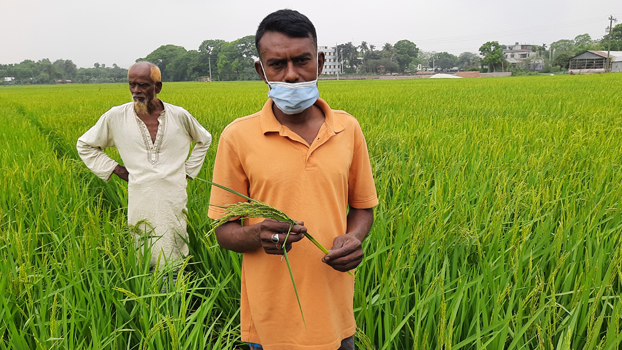Hot wind damaging Boro paddy in Chatmohar, farmers worried


In Chatmohar upazila of Pabna this season, boro paddy is getting damaged extensively due to hot wind. As a result, many farmers of the area are worried over the yield.
Local farmers’ hopes are turning to despair at a time when they were expecting bumper yields after seeing the flourishing paddy fields. However, when the paddy seedlings are earing, they are turning into blackish Chita (empty skins without rice).
According to Chatmohar office of the Department of Agricultural Extension (DAE), the target for Boro cultivation in the upazila this season was 9,700 hectors. However, Boro has been cultivated on 9,400 hectors of land in Chatmohar. Last year, Boro paddy was grown on 7,400 hectors of land in the Upazila whereas, 2,000 hectors of land more has been brought under Boro farming this year.
Azmat Ali, a Boro farmer from Afratpara area under Chatmohar municipality, said, “I have leased 5 and a half Bighas of land to grow BRRI dhan-58 variety of Boro paddy. The yield also seemed to be good. Three to four days ago the rice sheaf began to come out and its all are empty. I have leased land and cultivated paddy with a loan of Tk 50,000 from an NGO called Bureau Bangladesh and Tk 30,000 from Islami Bank. Now I am worried about how to repay the loans and how to survive.”
Another Boro farmer named Alal from the same area said, "I have leased three Bighas of land in Uthuli mouza of Mathurapur union with a loan of Tk 50,000 from Grameen Bank to grow Boro paddy on it. All the paddies have become Chita.” Another farmer named Mozammel Haque said, He had cultivated Boro paddy on one Bigha of land at a cost of Tk 10,000. However, most of the rice has become Chita due to the hot winds.
Chatmohar Upazila Agriculture Officer Md Al Imran said that in Chatmohar, Ufashi varieties o Boro paddy including BRRI dhan-28, Bridhan 29, Bridhan 57 and hybrid varieties including Partex, Tejgold, SL-8 and Chakka varieties are usually cultivated. The condition of the field was good, but during earing in some lands, excess amount of Chita is being found.
He further said, due to excessive temperature and hot wind, some lands are producing more Chita. This problem is seen in the lands where the paddy was blooming when the hot winds were blowing. They are instructing the farmers to mix 100 grams of potash with 10 liters of water and spray it on 5 decimal of land in the afternoon, he added.




